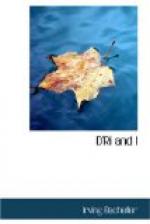Some seconds of a brief silence followed. I could hear them slowly dripping out of eternity in the tick of a watch near me. I felt the stare of many eyes invisible to me. A broad beam of bright light shot through the gloom, resting full upon my face. I started back upon the strong hands behind me. Then I felt my muscles tighten as I began to measure the fall and to wonder if I could clear the bayonets. I had no doubt I was to die shortly, and it mattered not to me how, bound as I was, so that it came soon. For a breath of silence my soul went up to the feet of God for help and hope. Then I bent my knees and leaped, I saw much as my body went rushing through the air—an empty grave its heap of earth beside it, an island of light, walled with candles, in a sea of gloom, faces showing dimly in the edge of the darkness, “Thank God! I shall clear the bayonets,” I thought, and struck heavily upon a soft mat, covered over with green turf, a little beyond that bristling bed. I staggered backward, falling upon it. To my surprise, it bent beneath me. They were no bayonets, but only shells of painted paper. I got to my feet none the worse for jumping, and as dumfounded as ever a man could be. I stood on a lot of broken turf with which a wide floor had been overlaid. Boards and timbers were cut away, and the grave dug beneath them. I saw one face among others in the gloom beyond the candle rows—that of his Lordship. He was coming up a little flight of stairs to where I stood. He moved the candles, making a small passage, and came up to me.
“You’re a brave man,” said he, in that low, careless tone of his.
“And you a coward,” was my answer, for the sight of him had made me burn with anger.
“Don’t commit yourself on a point like that,” said he, quickly, “for, you know, we are not well acquainted. I like your pluck, and I offer you what is given to few here—an explanation.”
He paused, lighting a cigarette. I stood looking at him. The cold politeness of manner with which he had taken my taunt, his perfect self-mastery, filled me with wonder. He was no callow youth, that man, whoever he might be. He was boring at the floor with the end of a limber cane as he continued to address me.
“Now, look here,” he went on, with a little gesture of his left hand, between the fingers of which a cigarette was burning. “You are now in the temple of a patriotic society acting with no letters patent, but in the good cause of his Most Excellent Majesty King George III, to whom be health and happiness.”
As he spoke the name he raised his hat, and a cheer came from all sides of us.




